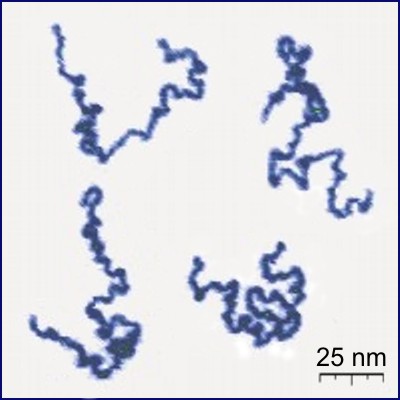|
Polymer Architecture
Polymer architecture in polymer science relates to the way branching leads to a deviation from a strictly linear polymer chain. Branching may occur randomly or reactions may be designed so that specific architectures are targeted. It is an important microstructural feature. A polymer's architecture affects many of its physical properties including solution viscosity, melt viscosity, solubility in various solvents, glass transition temperature and the size of individual polymer coils in solution. Different polymer architectures Random branching Branches can form when the growing end of a polymer molecule reaches either (a) back around onto itself or (b) onto another polymer chain, both of which, via abstraction of a hydrogen, can create a mid-chain growth site. Branching can be quantified by the branching index. Cross linked polymer An effect related to branching is chemical crosslinking - the formation of covalent bonds between chains. Crosslinking tends to increase Tg and in ... [...More Info...] [...Related Items...] OR: [Wikipedia] [Google] [Baidu] |
Polymer Branch
A polymer (; Greek '' poly-'', "many" + ''-mer'', "part") is a substance or material consisting of very large molecules called macromolecules, composed of many repeating subunits. Due to their broad spectrum of properties, both synthetic and natural polymers play essential and ubiquitous roles in everyday life. Polymers range from familiar synthetic plastics such as polystyrene to natural biopolymers such as DNA and proteins that are fundamental to biological structure and function. Polymers, both natural and synthetic, are created via polymerization of many small molecules, known as monomers. Their consequently large molecular mass, relative to small molecule compounds, produces unique physical properties including toughness, high elasticity, viscoelasticity, and a tendency to form amorphous and semicrystalline structures rather than crystals. The term "polymer" derives from the Greek word πολύς (''polus'', meaning "many, much") and μέρος (''meros'', meaning "part ... [...More Info...] [...Related Items...] OR: [Wikipedia] [Google] [Baidu] |
